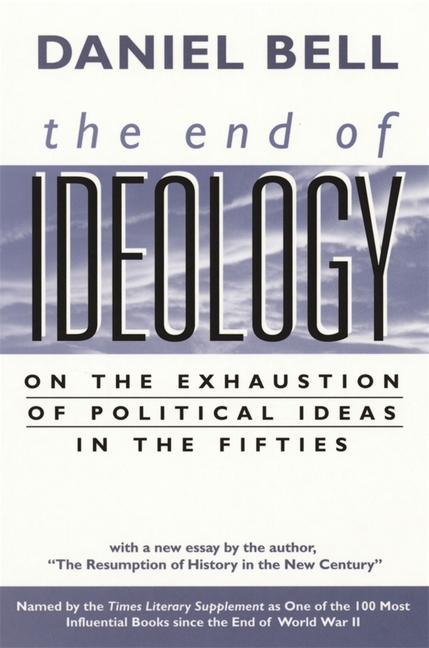
Zustellung: Mi, 20.08. - Mo, 25.08.
Versand in 2 Wochen
VersandkostenfreiBestellen & in Filiale abholen:
The End of Ideology has been a landmark in American social thought, regarded as a classic since its first publication in 1962. Daniel Bell postulated that the older humanistic ideologies derived from the nineteenth and early twentieth centuries were exhausted, and that new parochial ideologies would arise.
Inhaltsverzeichnis
The Resumption of History in the New Century Introduction: The Restless Vanity PART 1: AMERICA: THE AMBIGUITIES OF THEORY 1. America as a Mass Society: A Critique 2. The Breakup of Family Capitalism: On Changes in Class in America 3. Is There a Ruling Class in America? The Power Elite Reconsidered 4. The Prospects of American Capitalism: On Keynes, Schumpeter and Gaibraith 5. The Refractions of the American Past: On the Question of National Character 6. Status Politics and New Anxieties: On the "Radical Right" and Ideologies of the Fifties PART 2: AMERICA: THE COMPLEXITIES OF LIFE 7. Crime as an American Way of Life: A Queer Ladder of Social Mobility 8. The Myth of Crime Waves: The Actual Decline of Crime in the United States 9. The Racket-Ridden Longshoremen: The Web of Economics and Politics 10. The Capitalism of the Proletariat: A Theory of American Trade-Unionism 11. Work and its Discontents: The Cult of Efficiency in America PART 3: THE EXHAUSTION OF UTOPIA 12. The Failure of American Socialism: The Tension of Ethics and Politics 13. The Mood of Three Generations: A. The Once-Born, the Twice-Born, and the After-Born B. The Loss of Innocence in the Thirties C. Politics in the Forties D. Dissent in the Fifties 14. Ten Theories in Search of Reality: The Prediction of Soviet Behavior 15. Two Roads from Marx: The Themes of Alienation and Exploitation and Workers' Control in Socialist Thought The End of Ideology in the West: An Epilogue Afterword, 1988: The End of Ideology Revisited Acknowledgment Notes Index
Produktdetails
Erscheinungsdatum
30. Oktober 2000
Sprache
englisch
Untertitel
On the Exhaustion of Political Ideas in the Fifties, with the Resumption of History in the New Century.
5th edition.
Sprache: Englisch.
Auflage
5th edition
Seitenanzahl
540
Autor/Autorin
Daniel Bell
Verlag/Hersteller
Produktart
kartoniert
Gewicht
544 g
Größe (L/B/H)
210/140/28 mm
ISBN
9780674004269
Pressestimmen
Originally published in 1960, this collection of essays focuses on the protean nature of American society and the decay of Marxism and other systematic ideologies in the West...Arthur Schlesinger Jr. [has] admired the book's 'unflagging confidence, trenchancy, and authority.' -- Scott Veale New York Times Book Review 20001231
Bewertungen
0 Bewertungen
Es wurden noch keine Bewertungen abgegeben. Schreiben Sie die erste Bewertung zu "The End of Ideology" und helfen Sie damit anderen bei der Kaufentscheidung.










